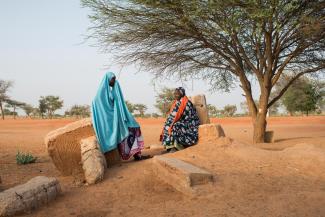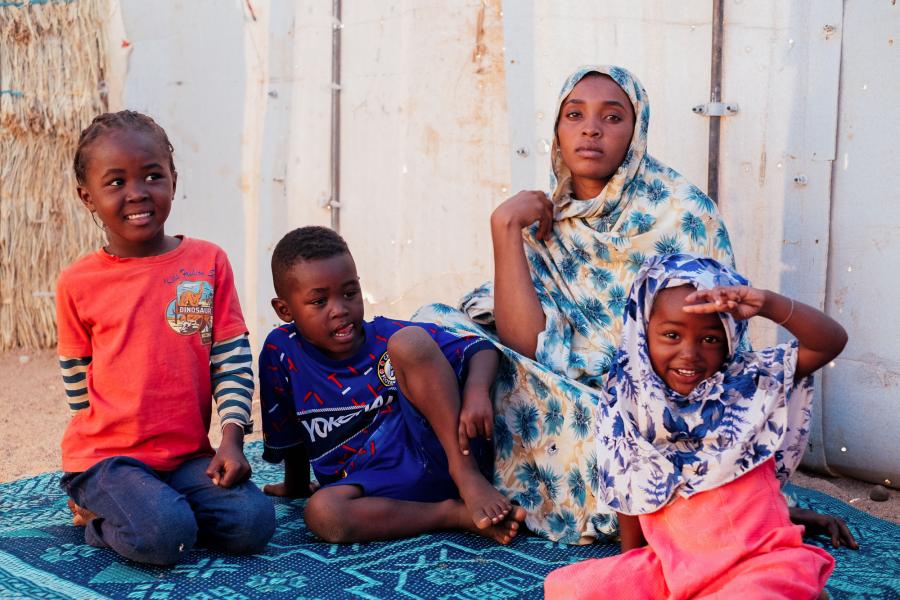2023 situation overview
At the end of 2023, approximately 3.3 million people were forcibly displaced across Burkina Faso, Mali, Mauritania and Niger, including 2.8 million internally displaced and over 529,700 refugees and asylum-seekers. Political instability, escalating conflict and violence, and food insecurity continued to drive displacement in the Sahel, deepening the protection crisis, while climate change exacerbated tensions over resources and further fuelled displacement.
Data from the inter-agency protection monitoring system Project 21, collected across Burkina Faso, Mali and Niger, revealed worsening protection risks and deteriorating basic services. In 2023, 70% of protection incidents were conflict-related and one in nine involved gender-based violence. Movement restrictions increased by 30%, and in the most affected communities, over 80% of children lacked access to primary education. In Niger, border closures hampered the delivery of assistance. The withdrawal of the United Nations Multidimensional Integrated Stabilization Mission in Mali (MINUSMA) meant that UNHCR and other actors had to adapt their response in the absence of its logistical support. Despite the challenging security context in the central Sahel, Project 21 consistently worked with over 25 local partners, providing an open channel of communication and access to hard-to-reach communities. Continuous data collection, through over 20,000 interviews and in more than 2,000 communities, supported evidence-based programming and the delivery of appropriate responses.
As the security situation deteriorated across the Sahel, internal and cross-border displacement increased. Significant movements were noted both within Mali and from Mali towards Algeria and Mauritania. UNHCR estimated that approximately 55,000 Malians crossed into Mauritania in 2023 and that 8,000 Mauritanian refugees returned from Mali to Mauritania. In Burkina Faso, internal displacement surpassed 2 million and an increasing number of people fled towards Mali and the Gulf of Guinea countries, namely Benin, Côte d’Ivoire, Ghana and Togo. There was also an increase in movements outside the region, with more people arriving in Italy from Burkina Faso and Mali.
Bolstering emergency preparedness and response across the sub-region was a priority for UNHCR in 2023. Contingency plans were developed or updated in Benin, Côte d’Ivoire, Mali, Niger and Togo. Regional emergency training took place in Mali for UNHCR staff and governmental and non-governmental partners from Burkina Faso, Mali and Niger, to enhance capacity, coordination and response to refugee emergencies. In Mauritania, a UN multi-sectoral and multi-partner contingency plan was designed to respond to the influx from Mali.
UNHCR’s response across the sub-region concentrated on the provision of life-saving and protection services. In Niger, nearly 33,600 refugees and 136,000 IDPs were assisted in obtaining civil registration and documentation. Capacity-building activities on civil registration and statelessness, which targeted over 1,100 government officials, civil society representatives, and community leaders, were delivered to enhance the knowledge, skills and capabilities of key stakeholders to improve upon the identification of statelessness, access to documentation and to ultimately ensure the protection of the rights of affected people. Sessions to raise awareness on gender-based violence reached more than 32,100 people.
In Togo, to strengthen cooperation with women-led organizations, UNHCR’s partnership with the “Club des Femme des Savanes” provided mobile gender-based violence emergency services, benefiting over 5,000 individuals, including refugees from Burkina Faso and host communities.
In Burkina Faso, UNHCR provided over 7,400 emergency shelters to address shelter needs, and close to 128,800 refugees and IDPs (15,407 households) received core relief items. In Mali, over 16,300 IDPs and 4,300 refugees were provided with emergency shelters.
To improve access to safe and quality education, 87 classrooms were built or rehabilitated in Burkina Faso, Mali and Niger. Additionally, 866 teachers were trained to support the integration of refugee children into the national education system, and 21,500 children received school kits. Furthermore, 184 people received scholarships for vocational training or access to education complementary pathways.
In Burkina Faso, Mali, Mauritania and Niger, nearly 126,200 people received cash assistance, for a total amount of $4.9 million, to meet shelter, livelihood, education and other protection needs.
In the context of mixed movements, with an increasing number of people seeking safety and protection beyond the region, in Burkina Faso, Mali, Mauritania and Niger, UNHCR continued to implement a route-based approach, supporting national protection and asylum systems along the routes and strengthening identification and referral mechanisms to provide alternatives to risky onward movements, including to North Africa. Community-based outreach activities were supported by working with local partners to disseminate accurate information on risks and local support services to people on the move. In Niger, for example, 23 monitors, trained in mixed movements, referred 27,241 individuals to the national asylum service. Similarly, in Burkina Faso, 5,727 asylum-seekers, including Malians, travelling in mixed movements, were identified and referred to relevant services.
Actions were undertaken to ensure a more environmentally friendly and sustainable humanitarian response and to protect forcibly displaced people in climate-vulnerable areas. In Niger, ongoing initiatives included the rehabilitation of degraded land in the regions of Tahoua, Tillaberi, and Diffa. Additionally, 6,000 people participated in awareness-raising sessions on alternative energy and the benefits of using enhanced stoves to improve living conditions and reduce pressure on natural resources.
In Burkina Faso, UNHCR actively promoted climate-smart agriculture to minimise the use of chemical fertilizers and reduce water consumption for irrigation, such as the production of bio-compost for above-ground and greenhouse market garden production in Ouaigouya, targeting over 200 households including refugees, IDPs and host community members. In Mali, UNHCR promoted the production of compressed bricks for building shelters, using locally available materials produced with hydraform block technology, which eliminates the need for energy-intensive production processes.
UNHCR continued to work with governments in the region to improve the protection environment for forcibly displaced people, including the legal framework for the protection of their rights. Ongoing advocacy efforts in Burkina Faso resulted in the validation of a draft law on internal displacement in line with the principles of the African Union Convention on the Protection and Assistance of Internally Displaced Persons in Africa.
Benin promulgated and published a law on the status of refugees and stateless persons. In the context of the coastal countries, UNHCR consistently advocated for governments to continue to implement their traditional hospitality and ensure access to territory and asylum. As a result, about 20,000 refugees from Burkina Faso were granted refugee status in Benin and Togo in 2023.
Close cooperation with governments and development actors was crucial to support greater inclusion of refugees in development plans to ensure longer-term solutions. In the Sahel, engagement continued with the African Development Bank and the World Bank. In Mauritania, four multi-year World Bank projects targeting refugees and host communities supported refugee inclusion in health, social protection, WASH, and urbanization. With host governments in the Gulf of Guinea, engagement with the World Bank led to a protection-oriented dialogue and provided space for refugee inclusion.
Additionally, coordination with governments and other humanitarian actors helped to ensure a consistent and coordinated approach to address the influx of refugees resulting from the deteriorating situation in the Sahel. UNHCR participated in and contributed to UN-wide coordination mechanisms, mainly through the UN Integrated Strategy for the Sahel, through the pillars of resilience, peace and security and governance.
Financial overview
More contributions information on previous years: Funding Update 2022 | Funding Update 2021
Refugees and locals live side-by-side in Niger’s 'opportunity villages'
By Colin Delfosse in Maradi, Niger
In the opportunity village of Garin Kaka, Nigerian refugees live and work alongside the local host community in a more sustainable alternative to refugee camps.
Read the story

